
March 20
1848 Revolutions of 1848 in the German states: King Ludwig I of Bavaria abdicates:
By March of 1848, Germany was a tinderbox waiting for a spark. This spark appeared in the form of the French Revolution that had started in February. Citizen-King Louis Philippe had betrayed his original supporters from the lower and middle classes, especially by denying them suffrage, and openly favored the rich upper class and aristocracy. He was overthrown and the Second Republic was proclaimed by revolutionary leaders from the working and middle classes In contrast to previous French revolutions, especially the revolution of 1789, this one immediately spread to Germany, not only because news now traveled fast by telegraph, but because the time was ripe for rebellion. Events began rolling.
1870 Birth: Paul Erich von Lettow-Vorbeck: German general, commander of the German East Africa campaign in World War I, the only colonial campaign of that war where Germany remained undefeated. Born to a military family in Saarlouis, von Lettow-Vorbeck studied military science as an artillery officer. He was posted to China in 1900 to quell the Boxer Rebellion. Afterwards, he was posted to German South-West Africa (now Namibia) to put down the Hottentot and Herero Rebellion between 1904 and 1908. He suffered an injury to his left eye and was forced to recuperate in South Africa, earning the friendship of Jan Smuts, against whom he would fight in World War I. He was the commander of the II. Seebataillon of the Kaiserliche Marine-Infanterie (German Marines) from January 1909 until January 1913. He also commanded the German colonial forces known as the Schutztruppe in Cameroon.
1904 Mysticism: Aleister Crowley invokes Horus in Egypt and declares the start of the New Aeon known as the Aeon Of The Crowned And Conquering Child.
Crowley was approached by the Ordo Templi Orientis, which invited him to take on a leadership role. The OTO claims to integrate "Freemasonic, Rosicrucian and Illuminist movements of the 18th and 19th centuries, the crusading Knights Templar of the middle ages and early Christian Gnosticism and the Pagan Mystery Schools." The leader of the OTO was a German named Theodor Reuss, a former Freemason and Illuminatus. He initiated Crowley into the sect in 1910 and in 1912 granted the Beast a charter to launch a British branch of the secret society. Crowley moved to the United States in 1914, at the onset of World War I, setting up shop in New York. In New York, Crowley continued recruiting.
1915 World War I: Britain and Russia divide future spoils of war:
Just two days after its navy suffered a demoralizing defeat against Turkish forces at the Dardanelles, the British government signs a secret agreement with Russia regarding the hypothetical post-World War I division of the former Ottoman Empire.
By the terms of the agreement, signed on March 20, 1915, Russia would annex the Turkish stronghold of Constantinople, the Bosporus Strait (a waterway connecting the Black Sea with the Sea of Marmara and marking the boundary between the Asian and European halves of Turkey), and more than half of the European section of Turkey. Britain also promised Russia future control of the Dardanelles (the crucially important strait connecting the Black Sea with the Mediterranean)‑-which the British navy had unsuccessfully attacked two days earlier‑-and the Gallipoli peninsula, the target of a major Allied military invasion (which would also result in failure) launched late the following month. In return, Russia would agree to British claims on other areas of the former Ottoman Empire and central Persia, including the oil-rich region of Mesopotamia. (History.com)
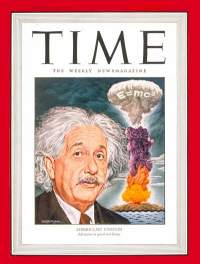
1916 Albert Einstein publishes his theory of relativity.

1917 Birth: Dame Vera Lynn: British singer, the 'forces sweetheart' of World War II with We'll meet again and White Cliffs of Dover, and in 1952 Auf Wiederseh'n, Sweetheart. She will be made a Dame of the British Empire in 1975.
1919 Various:
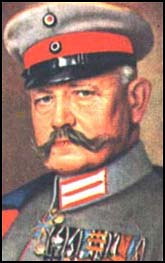
Paul von Hindenburg on Kaiser Wilhelm II's Abdication:
Public opinion has been recently discussing the question why the Kaiser went to Holland. To obviate erroneous judgments, I should like to make the following brief observations. When the Imperial Chancellor, Prince Max of Baden, announced the Kaiser's abdication on November 9th, without the Kaiser's previous declaration of assent, the German Army was not beaten, but its strength had dwindled and the enemy had fresh masses in readiness for a new attack. The conclusion of the armistice was directly impending. At this moment of the highest military tension revolution broke out in Germany, the insurgents seized the Rhine bridges, important arsenals, and traffic centres in the rear of the army, thereby endangering the supply of ammunition and provisions, while the supplies in the hands of the troops were only enough to last for a few days. The troops on the lines of communication and the reserves disbanded themselves, and unfavourable reports arrived concerning the reliability of the field army proper. In view of this state of affairs the peaceful return home of the Kaiser was no longer to be thought of and could only have been enforced at the head of loyal troops. In that case the complete collapse of Germany was inevitable.
Birth: Erich Gerhard Barkhorn: Luftwaffe fighter pilot and "Ace," officially credited with 301 kills on the Russian front. Barkhorn survived the war and is said to have shot down more enemy planes than any other pilot in the war except his own countryman, Erich Hartmann. Note: 301 kills is hardly possible, as Allied aviators were well aware. Some fudging of the numbers was inevitable. [For further details, Click here.]
1920 Weimar: The Muenchener Beobachter shareholders are listed as follows: Kathe Bierbaumer 46,000, Dora Kunze 10,000, Baron Franz von Freilitzsch 20,000, Theodor Heuss 10,000, Gottfried Feder 10,000, Franz Xavier Eder 10,000, Wilhelm Gutberlet 10,000, Karl Alfred Braun 3,500. Freilitzsch and Heuss are members of the Thule Society and Feder is one of Hitler's associates. (THP)
1922 The USS Langley is commissioned as the first United States Navy aircraft carrier.
1933 Various:
Death: Giuseppe Zangara:
Giuseppe Zangara went to Florida's electric chair for the murder of Chicago mayor Anton Cermak: the man he had accidentally shot while attempting to assassinate President-elect Franklin Delano Roosevelt. (Note: There is some reason to believe that it was a mob hit, and Cermak was actually the intended target.)
A strange and strangely forgotten man, the Italian immigrant came within inches of dramatically altering American history. On February 15, 1933, at a Roosevelt speech in Miami's Bayfront Park, Zangara perched himself on a metal folding chair within ten meters of the man who was then President-elect, but somehow managed to miss him. A bystander, Lillian Cross, grabbed his arm, and others in the crowd wrestled him down.
Countdown to the Third Reich: Negotiations begin between Hitler and Wilhelm Frick on one side and the Catholic Center Party leaders, Kaas, Stegerwald and Hackelsburger, on the other. The question is: under what conditions would the Center Party vote for an Enabling Act desired by Hitler? Note: The consent of the Catholic party is necessary if this act is to receive the required two-thirds majority vote. (THP) [See: Was Adolf Hitler a Christian?]
Dachau: The first of many Nazi concentration camps opens:
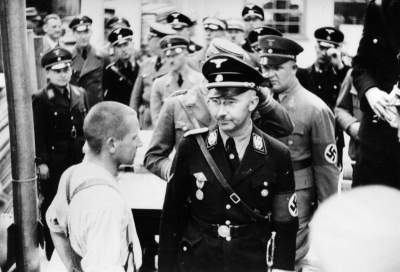
The Dachau concentration camp was the first regular concentration camp established by the Nazis. Heinrich Himmler, in his capacity as police president of Munich, officially described the camp as "the first concentration camp for political prisoners." It was located on the grounds of an abandoned munitions factory near the northeastern part of the town of Dachau, about 10 miles northwest of Munich in southern Germany. During the first year, the camp held about 4,800 prisoners and by 1937 the number had risen to 13,260. Initially the internees consisted primarily of German Communists, Social Democrats, and other political opponents of the Nazi regime. Over time, other groups were also interned at Dachau such as Jehovah's Witnesses, Roma (Gypsies), homosexuals, as well as "asocials" and repeat criminals. During the early years relatively few Jews were interned in Dachau and then usually because they belonged to one of the above groups or had completed prison sentences after being convicted for violating the Nuremberg Laws of 1935. In early 1937, the SS, using prisoner labor, initiated construction of a large complex of buildings on the grounds of the original camp. Prisoners were forced to do this work, starting with the destruction of the old munitions factory, under terrible conditions. The construction was officially completed in mid-August 1938 and the camp remained essentially unchanged until 1945. Dachau thus remained in operation for the entire period of the Third Reich.
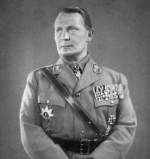
Hermann Goering issues orders to the police authorizing the use of force against hostile demonstrators.
Holocaust: The American Jewish Committee and B'nai B'rith jointly condemn Germany for denying German Jews their basic rights. The Jews of Vilna (Vilnius, Lithuania) declare an anti-Nazi boycott. (THP) [See: What Was the Nature of Hitler's Anti-Semitism?]
1934 Various:
Germany lifts the ban on Jewish organizations as long as they remain uninvolved in politics.
From a radio address by Hans Frank:

The first task was that of uniting all Germans into one State. It was an outstanding historical and legislative accomplishment on the part of our Fuehrer that by boldly grasping historical development he eliminated the sovereignty of the various German states. At last we have now, after 1,000 years, again a unified German State in every respect. It is no longer possible for the world, based on the spirit of resistance inherent in small states, which are set up on an egoistical scale and solely with a view to their individual interest, to make calculations to the detriment of the German people. That is a thing of the past for all times to come . . . . The second fundamental law of the Hitler Reich is racial legislation. The National Socialists were the first in the entire history of human law to elevate the concept of race to the status of a legal term. The German Nation, unified racially and nationally, will in the future be legally protected against any further disintegration of the German race stock... The sixth fundamental law was the legal elimination of those political organizations which within the State, during the period of the regeneration of the people and the reconstruction of the Reich, were once able to place their selfish aims ahead of the common good of the nation. This elimination has taken place entirely legally. It is not the coming to the fore of despotic tendencies, but it was the necessary legal consequence of a clear political result of the 14 years' struggle of the NSDAP. In accordance with these unified legal aims in all spheres, particular efforts have for months now been made regarding the work of the great reform of the entire field of German law. As the leader of the German jurists, I am convinced that, together with all strata of the German people, we shall be able to construct the legal state of Adolf Hitler in every respect and to such an extent that no one in the world will at any time be able to dare to attack this constitutional state as regards its laws."
1936 Hitler speaks in Hamburg:
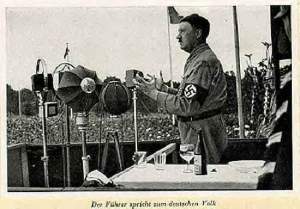
I need the German people in the struggle that I carry on for its own sake, in the struggle for German equality, in the struggle against the insolence of others who still regard Germany as an inferior or as enjoying inferior rights, or who try to act as if such were the case. I need the German people to demonstrate therewith to the whole world that whatever happens we will not retreat one inch.
1939 Various:
The US ambassador to Germany is recalled to protest the dissolution of Czechoslovakia.
Holocaust: Reichprotector Constantin von Neurath bans all "unofficial Aryanization" of Jewish property in former Czechoslovakian territories. All Jews are dismissed from their jobs as municipal employees. (THP)
1940 World War II: France: Edouard Daladier is forced to resign as Premier, primarily for failing to aid Finland against the Soviets.
1941 Various:
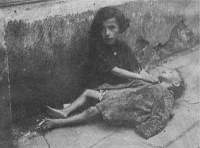
Holocaust: Poland: The German deadline for all Jews to be inside the Polish ghettos expires. [See: Was the Holocaust Detrimental to Hitler's War Effort?]
Church and Reich: Munich, Brown House, Personal-Secret:To: All Gau leaders. Subject: Sequestration of Church properties (Monastery property, et cetera).
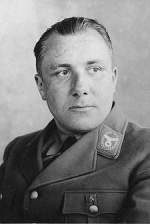
Recently, valuable church properties have had to be sequestered on a large scale, especially in Austria; according to reports of the Gauleiter to the Fuehrer these sequestrations were often because of violations of ordinances relating to war economy (for example, hoarding of foodstuffs of various kinds, textiles, leather goods, et cetera). In other cases they were for violations of the law relating to subversive acts against the State and in some cases because of illegal possession of arms. Obviously no compensation is to be paid to the churches for sequestrations made for the above-mentioned reasons. With regard to further sequestrations, several Austrian Gau leaders, on the occasion of the Fuehrer's last visit to Vienna, attempted to clarify the question of who should acquire such sequestered properties. Please take note of the Fuehrer's decision, as contained in the letter written by Reich Minister Dr. Lammers to the Reich Minister of the Interior, dated 14 March 1941. I enclose copy of extracts of the same. -Martin Bormann."
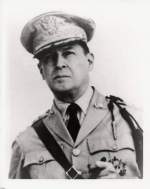
1942 World War II: General Douglas MacArthur—at Terowie, South Australia—makes his famous speech regarding the fall of the Philippines, in which he says: "I came out of Bataan and I shall return". (List-owner's Opinion: MacAurthur is possibly the most over-rated General of World War II. See the famed biography American Caesar: Douglas MacArthur 1880-1964 by William Manchester for further details.)
1943 World War II: Hitler leaves Wolf's Lair on doctor's orders and recuperates at Obersalzberg.
1944 World War II: Various:
Stalin to FDR:

I have received your message setting forth the draft of your letter to the President of Turkey about Turkish deliveries of chrome to Germany. The representation you suggest making to the Turks is, I think, most timely, although I must say that I have little hope of positive results.
War against Japan: Four thousand U.S. Marines make a landing on Emirau Island in the Bismarck Archipelago to develop an airbase as part of Operation Cartwheel.
Holocaust: Professor Otmar Freiherr von Verschuer sends a progress report to the DFG:

My assistant, Dr. Mengele, has joined this part of the research as a collaborator. He is employed as an SS-Captain and camp doctor in the concentration camp of Auschwitz. With the approval of the Reichsfuehrer-SS (Himmler), anthropological studies have been carried out on the very diverse racial groups in this camp, and blood samples have been sent to my laboratory for processing. (THP)

Holocaust: The death camp at Majdanek is evacuated: The sick are sent to Auschwitz for immediate gassing. Able-bodied men are sent to Gross Rosen, and women are sent to Ravensbrueck and Natzweiler. (THP)
1945 World War II: Various:
Eastern Front: Newly appointed commander of the Army Group Vistula, General Gotthard Heinrici, correctly anticipates that the main Soviet thrust will be made over the Oder River and initiates defensive preparations on the outskirts of Berlin. [See: The Last Days of the Third Reich.]
Molotov to Eden:
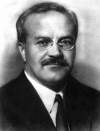
In Berne for two weeks, behind the backs of the Soviet Union, which is bearing the brunt of the war against Germany, negotiations have been going on between the representatives of the German military command [Note: Secret talks code-named "Crossword," between SS Commander in Italy General Karl Wolff and Allen Dulles on the one hand, and representatives of the English and American commands on the other.]
British troops liberate Mandalay, Burma:
On this day, the 14th Army, under British Gen. William J. Slim, captures the Burmese city of Mandalay from the Japanese, bringing the Allies one step closer to liberating all of Burma.
Mandalay, a city on the Irrawaddy River in central Burma (now Myanmar), was the center of the communications in Burma, as well as of rail, road, and river travel. The British conquered Mandalay, the second-largest city in Burma, in 1885. Burma as a whole was detached from India by the British in the Government of India Act of 1935 and made a Crown Colony with its own constitution and parliament. Burmese nationalists plotted with the Japanese in the late 1930s to wrest Burma from the British Empire and bring the nation within the Japanese Empire. Attempts by the nationalists to undermine the building of the Burmese Road (which would create an overland link between the West and China) and incite riots failed, and Burma remained a British colony.
On December 8, 1941, the Japanese took matters into their own hands and invaded Burma. Troops landed at Victoria Point, at the southern tip of the peninsula. Moving north, the Japanese troops, composed mostly of disgruntled Burmese nationals who fashioned themselves an army of liberation, determined to expel the Brits from their homeland, advanced on Rangoon, Lashio (the Burmese end of the Burma Road into China), and Mandalay, which fell on May 2, 1942. With the Japanese holding central Burma, China was cut off from the West-and Western supplies.
In early 1944, British Gen. William J. Slim, commander of the 14th Army, led an offensive against the Japanese that broke a siege at Imphal. By mid-December, buoyed by his success, Slim launched an offensive against Meiktila, east of the Irrawaddy River and a key communication post between Rangoon and Mangalay. A strategy of misdirection was employed, with one corps headed toward Mandalay even as Slim's immediate objective was Meiktila. With the Japanese preoccupied with the first corps, a second corps took Meiktila on March 3, 1945, and Mandalay fell on the 20th. The 14th Army now controlled a significant swath of central Burma. Rangoon, the capital, would fall in May, returning Burma to British hands. (History.com)
1946 Nuremberg Tribunal: On day 86, as the wily Hermann Goering is cross-examined by Justice Jackson, the chief US prosecutor loses his cool and goes off on an unproductive rant.

Jackson: If the Tribunal please, the last question which I asked last night referring to mobilization preparations in the Rhineland, as shown in the official transcript, was this: "But of a character which had to be kept entirely secret from foreign powers?" The answer was: "I do not believe I can recall the publication of the preparations of the United States for mobilization." Now, representing the United States of America, I am confronted with these choices: to ignore that remark and allow it to stand for people who do not understand our system; or to develop, at considerable expense of time, its falsity; or to answer it in rebuttal. The difficulty arises from this, Your Honor, that if the witness is permitted to volunteer statements in cross-examination there is no opportunity to make objection until they are placed on the record. Of course, if such an answer had been indicated by a question of counsel, as I respectfully submit would be the orderly procedure, there would have been objection; the Tribunal would have been in a position to discharge its duty under the Charter and I would have been in a position to have shortened the case by not having that remark placed.
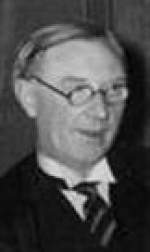
From the diary of the British Alternate Judge, Mr. Justice Birkett: The trial from now on is really outside the control of the Tribunal, and in the long months ahead the prestige of the trial will steadily diminish.
[See: Are There Any Lasting Effects From the Nuremberg Trials?]Albert Speer—in conversation with Dr. Gilbert:
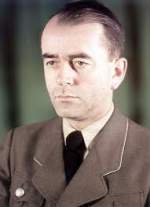
You know, when Jackson cross-examines Goering, you can see that they represent two entirely opposite worlds—they don't even understand each other. Jackson asks him if he didn't help plan the invasion of Holland and Belgium and Norway, expecting Goering to defend himself against a criminal accusation, but instead Goering says, "Why yes, of course, it took place thus and so", as if it were the most natural thing in the world to invade a neutral country if it suits your strategy. (Gilbert)
From the letters of Thomas Dodd:
The Justice continued his cross-examination of Goering and gave him a good pasting with documents and new information at our disposal . . . we discovered only the night before one document which showed Goering as advocating cruel treatment for American and British flyers who were prisoners of war. The cross-examination continued all day with the Justice looking very good and Goering looking very poorly.
1952 Peace: The United States Senate ratifies a peace treaty with Japan.
1953 Khrushchev begins his rise to power:
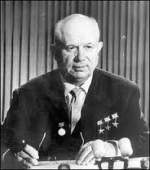
The Soviet government announces that Nikita Khrushchev has been selected as one of five men named to the new office of Secretariat of the Communist Party. Khrushchev's selection was a crucial first step in his rise to power in the Soviet Union—an advance that culminated in Khrushchev being named secretary of the Communist Party in September 1953, and premier in 1958.
The death of Joseph Stalin on March 5, 1953 created a tremendous vacuum in Soviet leadership. Stalin had ruled the Soviet Union since the 1920s. With his passing, the heir apparent was Georgi Malenkov, who was named premier and first secretary of the Communist Party the day after Stalin's death. This seemingly smooth transition, however, masked a growing power struggle between Malenkov and Nikita Khruschev. Khrushchev had been active in the Russian Communist Party since joining in 1918. After Stalin took control of the Soviet Union following Lenin's death in 1924, Khrushchev became an absolutely loyal follower of the brutal dictator. This loyalty served him well, as he was one of the few old Bolsheviks who survived Stalin's devastating political purges during the 1930s. (History.com)
Edited by Levi Bookin (Copy editor)
levi.bookin@gmail.com
FAIR USE NOTICE: This site may contain copyrighted material the use of which has not always been specifically authorized by the copyright owner. We are making such material available in our efforts to advance understanding of historical, political, human rights, economic, democracy, scientific, environmental, and social justice issues, etc. We believe this constitutes a 'fair use' of any such copyrighted material as provided for in section 107 of the US Copyright Law. In accordance with Title 17 U.S.C. Section 107, the material on this site is distributed without profit to those who have expressed a prior interest in receiving the included information for research and educational purposes. If you wish to use copyrighted material from this site for purposes of your own that go beyond 'fair use', you must obtain permission from the copyright owner.
Please note that the list-owner and the moderator are not responsible for, and do not necessarily approve of, the random ads placed on our pages by our web server. They are, unfortunately, the price one pays for a 'free' website.